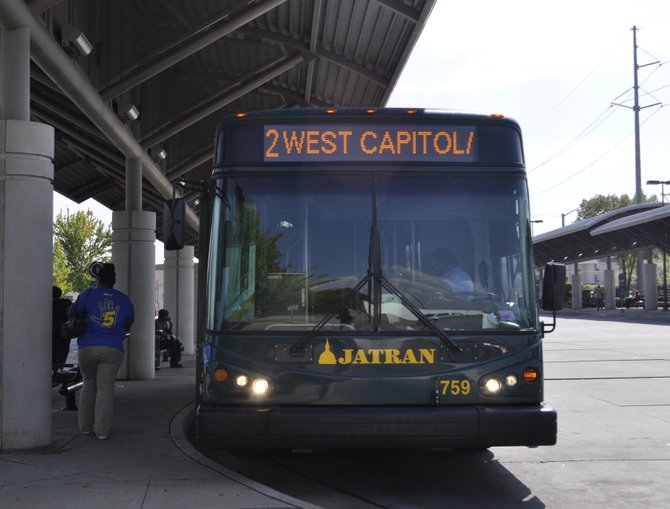A new resolution to convert the JATRAN bus system to run on natural gas could save the City millions and free up funding that can go toward several maintenance issues. Photo by Trip Burns.
Summer is officially here, and some JATRAN passengers are melting. Due to ongoing issues with air-conditioning units on several JATRAN buses, passengers might have to find an alternative solution to their traveling needs this summer.
Sheila O'Flaherty, who travels via JATRAN to and from her job on the Capital Defense Counsel at the Office of State Public Defender, spoke to the Jackson City Council on behalf of several bus passengers at a meeting last Tuesday.
O'Flaherty expressed confusion with the buses having operational issues when a piece of federal legislation, Moving Ahead for Progress in the 21st Century Act (MAP-21), recently passed that loosened regulations on how the Federal Transit Administration uses its money.
President Barack Obama signed MAP-21 into law back in July 2012. The legislation allows funding for surface transportation programs at more than $105 billion for fiscal years 2013 and 2014, and it builds on many transportation programs and policies for highways, transits, bikes and pedestrians that were put in place in 1991.
Before the legislation, money was strictly used to buy buses. However, O'Flaherty says money can now be used for operational repairs thanks to the "Hundred Bus Rule," which allows federal funding to go toward operation management for buses in cities with fewer than 100 buses in the fleet.
"Some of us are concerned that the city may not be using all of the federal funds available," O'Flaherty said. "I don't know if it's true or not true. ... I do think that the buses are currently breaking down a lot, and no (fixed-route) buses have been bought."
"It has been at least five years since the city bought a fixed-route bus. They're supposed to last five years, and I'm sure that's what the city is counting on."
However, some of the buses do not seem to be holding up. O'Flaherty said that at least half of the buses she rides on do not have working air conditioning.
JATRAN has two kinds of buses, fixed-route and paratransit. Fixed-route buses transport people to predetermined destinations on a regular route. Paratransit buses, or HandiLift, assist with the transportation of the temporarily or permanently disabled. O'Flaherty is alleging that much of the federal funding has been going toward the paratransit buses, which is leaving the fixed-route buses unattended for needed repairs.
O'Flaherty said that she was told at the city council meeting and the most recent fixed-route riders meeting, which meets on the last Saturday of each month, that the city currently has the money to fund one and a half buses right now, supposedly $600,000. One bus costs roughly $400,000. She said that the city currently has approximately 10 fixed-route bus routes.
Calls to Elvin Tobin, JATRAN's manager, for comment on the issue were not returned.
Many passengers are also complaining that the fixed-route buses are taking too long to get to their stops. O'Flaherty said that people are waiting up to 30 minutes or longer for the next bus during transfers.
Carl Marks, a system analyst for the financial aid department at Jackson State University, uses JATRAN for daily travel and agrees with O'Flaherty. Marks said that he is fairly certain that federal money is available to help JATRAN but is worried that no one is taking the initiative to apply for it.
Marks said one of the operational problems he has experienced lately was an instance where the bus that was on its way to pick up Marks and a few other passengers broke down. After another bus was sent, the doors on the second bus stopped working, which means the bus could not move. Marks said that he and the other passengers were trapped inside the bus in front of First Baptist Church for almost 45 minutes until someone could come fix the problem.
However, a solution to bus maintenance problems may be on its way.
Ward 4 Councilman De'Keither Stamps told the Jackson Free Press that he has recently convinced the rest of the council to support a resolution that would convert the bus system to run on compressed natural gas, which Stamps says will save the city more than $2 million a year. The gas conversion would also free up millions that could then go toward maintenance of the buses, Stamps said.
"This is one of those solutions that is just common sense," Stamps said. "It isn't about finding new resources but utilizing the resources we already have. "
Stamps also said that he is interested in seeing the bus system expand its routes as well as turning it into a 24-hour system that passengers can always rely on.
Mayor Tony Yarber was on board with the resolution when he was on council; however, he has yet to address the solution since his election to mayor last month.



Comments
Use the comment form below to begin a discussion about this content.